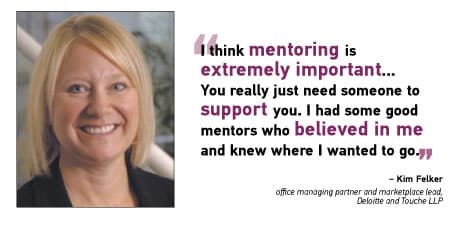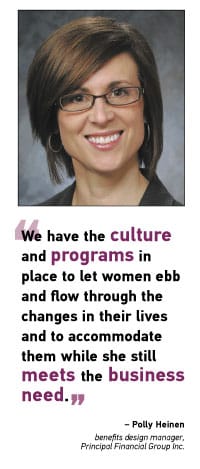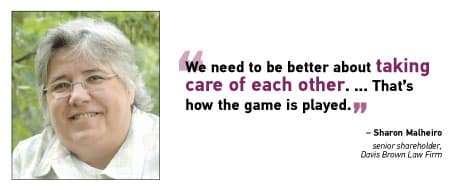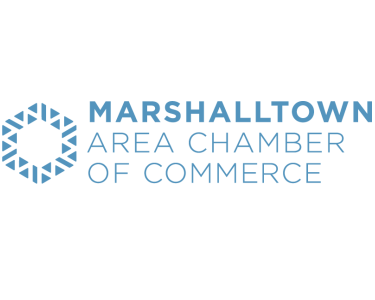Zeroing in on the gender gap
Iowa still has a long way to go, but three Des Moines companies are working on finding solutions

There’s something lacking in many of Iowa’s boardrooms, top offices and legislative committees: women.
A recent study by Nexus, an Iowa women’s networking group, shows that female business owners trail their male counterparts in entrepreneurial activity, revenues and patents. And with only 26 percent of the state’s small businesses being owned by women, Iowa lags behind the national average of 34 percent.
The percentage of female legislators has hovered between 20 and 23 percent since 2003, and in the last legislative session, Iowa ranked 33rd among the 50 states, with 21.3 percent of legislators being women. Currently, there are no women on the state’s Supreme Court.
The study also found that woman are missing in the board room. A look at Iowa’s 11 largest publicly traded companies’ boards of directors shows that only 16 percent of the members were women. Several of those companies, such as Heartland Express Inc., Sauer-Danfoss Inc. and Winnebago Industries Inc., had no female board members at all.
A 2010 McKinsey Quarterly report found that Iowa is not alone, saying that “despite the sincere efforts of major corporations, the proportion of women falls quickly as you look higher in the corporate hierarchy. Overall, this picture has not improved for years.”
But several companies in Central Iowa have put practices and policies into place aimed at correcting these disparities.
Here’s a look at three companies that have increased the number of women in top positions:
Deloitte and Touche LLP
Nearly twenty years ago, Deloitte and Touche LLP launched the Women’s Initiative, which focuses on retaining and promoting women within the company. Before the initiative began in 1993, the Big Four accounting practice saw that although it was recruiting women at the same rate as men, they were leaving the firm at a much higher pace than their male peers, which resulted in an underrepresentation in leadership positions.
Over the years, the development-and-mentorship program has helped boost the percentage of female partners and principals from 7 percent to 24 percent. Additionally, women now make up one-third of the company’s board of directors.
Kim Felker, who was appointed to lead Deloitte’s Des Moines office as the office managing partner and marketplace lead last August, said although it’s taken time and the company still isn’t where it would like to be, it has seen vast improvement. 
Because the accounting field is so competitive, Deloitte offers management development programs, three of which are geared toward women. The programs are specifically focused on helping employees advance their careers as well as balance their work and personal lives. Another important aspect the company’s development programs promote is mentoring, she said.
“I think mentoring is extremely important,” Felker said. “I actually had a few male mentors because there weren’t too many females then. You really just need someone to support you. I had some good mentors who believed in me and knew where I wanted to go.”
Felker, who is the first woman to lead a major accounting firm in Des Moines, now works with and helps younger women advance their careers.
Deloitte also gives its employees the opportunity to work with a more flexible schedule, Felker said. “Depending on where you are in your career, you can dial up or dial down,” she said. “And your pay is adjusted accordingly.”
Depending on employees’ schedules, they can adjust their hours to drive a carpool or attend a child’s sports game.
“You can balance your work life a little bit more,” she said. “Check out for a while if you need to. … Depending on your clients’ needs, you can come and go as you need. That helps keeps employees more motivated. I know a lot of jobs that are just not flexible at all.”
Felker said when it comes to advancing in their careers, women still face barriers such as taking time off for maternity leave or accepting promotions that involve relocation.
“If you’re married, your husband most likely has a full-time job and relocating is just hard,” she said. “It might be easier for someone who has a spouse who stays home with the kids. If you want to advance your career, relocation can be a problem.”
However, Felker is happy with the policies put into place to address these problems and help women succeed.
“Overall, Deloitte has done such a nice job focusing on getting women in leadership roles, advancing them and keeping our women,” she said. “They’ve been extremely focused on it, and that comes from our leader’s tone. I’ve been very happy with the progress they’ve made. We still have a ways to go, but I think we’re getting there.”
Principal Financial Group Inc.
With women making up 36 percent of senior managers, 37 percent of corporate executives and 33 percent of board members, Principal Financial Group Inc. is doing something that is working.

The 10,781-person company offers a Women’s Network for Leaders, which includes mentorship programs and an executive speaker series, as well as formal developmental programs. However, Heinen said she believes it’s Principal’s flexible scheduling that really allows women to succeed.
Employees have several options when it comes to having a more flexible schedule, she said. They no longer have to work the traditional 8 a.m. to 5 p.m. Monday through Friday schedule. Instead they can choose to compress their weeks by working more hours certain days, allowing them time off on others; work from home several days a week; or adjust their hours, for instance, by coming in at 7 a.m. and leaving at 4 p.m.
“It lends itself for women to have control of their careers,” Heinen said. “We have the culture and programs in place to let women ebb and flow through the changes in their lives and to accommodate that while she still meets the business need.”
Flexible scheduling isn’t just for working moms either.
“We’ve seen a whole slew of reasons,” Heinen said. “Some people just want to volunteer more. … They’re engaged in their job but want to be involved in the community. … Fathers want to be more engaged, so maybe they’ll come in at 6:30 so they can leave in time for a 3 o’clock practice.”
In addition to flexible scheduling, Principal offers comprehensive paid time off for new mothers and fathers, as well as working caregiver leave, which allows new moms to work on a reduced schedule for 6 months. “It has really helped to ease that transition and give people the time they need to pull away on a phased basis.” Heinen said, adding that employees also use it for other purposes, such as taking care of a sick spouse or parent.
Once mothers are back at work, they can enroll their children in Principal’s on-site child care. Now, in its fourth year, the program has 170 children enrolled. The company partners with Bright Horizons Childrens Centers LLC to offer the child care, which parents are responsible for paying for, while Principal pays for “enrichment programs,” such as yoga or music classes.
“I think Principal has always been very proactive on keeping an eye on what’s happening on the market … not only in Des Moines area but across the country,” Heinen said.
“When you have a healthy employee, you have a happy employee who is likely to be more productive and satisfied in their jobs. There really is a business case around it that we can work to quantify.”
Davis Brown Law Firm
About 36 percent of Davis Brown’s 78 employees are female. Women also make up 36 percent of the law firm’s partners, one of the highest ratios compared with other Central Iowa law firms. But Sharon Malheiro, a senior shareholder and current president of the board of directors, said Davis Brown hasn’t intentionally set any policies to help women rise up the ranks. Rather the law firm wants every new attorney to become partner.
She also said the firm had strong female role models early on who helped to pave the road for newer female attorneys.

“They probably didn’t have as good a work-life balance but I think they broke the ceiling and therefore everyone realized you know if someone is gone on maternity leave and they can come back, they can be up to speed on their practice,” she said. “And I think (the men) realized they liked having them back.”
Malheiro said the majority of females at Davis Brown are members of the Polk County Women Attorneys group and get together on a semiregular basis to talk about work issues. Having a support system, she said, gives female lawyers a forum to talk to one another and see how others approach things.
“We need to be better about taking care of each other,” she said, adding that she makes a point to refer work or cases to other female attorneys because “that’s how the game is played.”
Malheiro said despite the advancements women have made in the legal profession, compensation is still an issue.
“I think it’s the way at times the business of law is conducted,” she said. “In a larger firm, lawyers generally get compensated on amount of business they bring in. I don’t think women are as adept at bringing in that business as men are. But I think they are starting to make inroads.”
Women are still working against old prejudices as well. When Malheiro first began working at Davis Brown about 20 years ago, Des Moines area women were not allowed to hold a membership at a country club, which is where attorneys would often find business.
Thankfully, that’s now changed, she said, but it still puts women at a disadvantage because they are still playing catch-up.
“Larger law firms are very numbers driven. Numbers in terms of the hours you bill in addition to number of dollars you bring in,” she said. “It can be competitive. … I think that the reality is that if a female lawyer is in a relationship and wants to raise a family or have a child, that is automatic time away from practice.”
However, because Davis Brown puts a strong emphasis on work-life balance, Malheiro believes both men and women are able to succeed.
“I think lawyers are better lawyers if they have other things they enjoy outside of the office,” she said.










